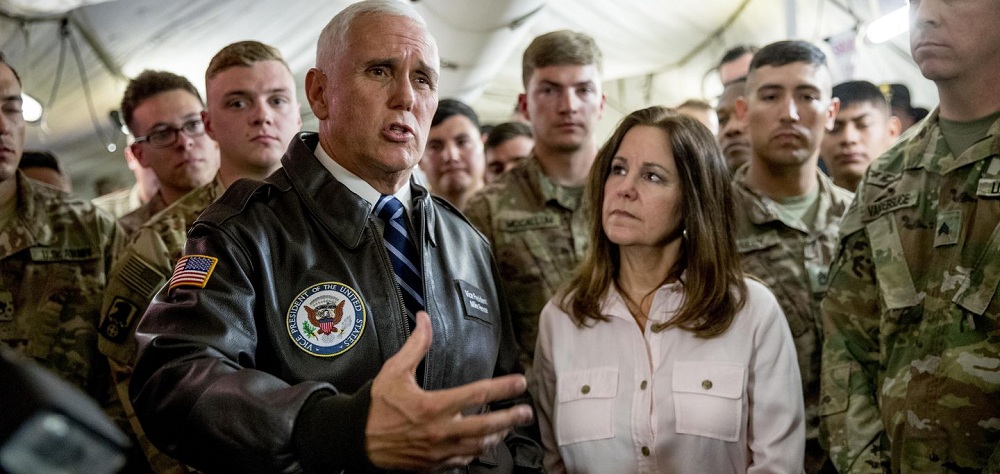Alwaght- The US Vice-president Mike Pence visited Iraq on Saturday on a surprise visit. He immediately visited an American base in Al-Anbar province instead of visiting the capital Baghdad. He then went to the Kurdish region where he visited the autonomous region’s leaders in the capital Erbil. In a largely meaningful move, he only talked by phone with the Iraqi Prime Minister Adel Abdul Mahdi, signaling that the bilateral relations are struck by chill. Although the office of the PM issued a statement in which it suggested that the phone call between the two sides focused on improving the bilateral relations and seeking new cooperation ways, Pence’s decline to meet the Iraqi politicians gives the idea that the main goal of the trip is not improving the ties and cooperation with Baghdad.
Channeling Iraq developments
Pence’s trip to Iraq came while the Arab country has been grappling with street protests, now in their second month, in the capital Baghdad and other provinces, mainly the southern ones. With the start of the demonstrations, which first protested poor living conditions and then developed more radical to call for resignation of the PM Abdul Mahdi and dissolution of the parliament, the US State Department voiced support to the protestors and called for Baghdad to write a new election law and hold early elections. The Secretary of State Mike Pompeo openly called on Iraq to pass a new election law and hold early elections. The remarks aroused the ire of the Iraqi politicians who blasted the comments and said this was a brazen intervention in their home affairs. The cold reception of Pence bears witness to this fact.
Washington’s drives for taking such stances are clear. After all, the 2018 parliamentary elections brought to power anti-American political forces who dominated both the parliament and the government. The White House’s big defeat after the elections can be understood better if we look at the bill by the parliament to expel the American forces stationed in Iraq. In February, the US President Donald Trump said that the American troops are kept in Iraq to watch neighboring Iran. The comments triggered waves of negative reactions from the Iraqi politicians. Almost all parties, mainly Saeroon, led by Muqtada al-Sadr, and Fatah, led by Hadi al-Amiri, in a statement called on the American forces to withdraw from the Iraqi territories. President Barham Saleh like the parliamentarians reacted to the comments and said that the American mission in Iraq is training the Iraqi forces not watching Iran. He demanded drawing lines for the Americans in Iraq.
These developments come while after the Trump pullout of the nuclear deal with Iran in May 2018, the White House continuously put strains on Baghdad asking it to stop cooperation with Tehran amid reinstated sanctions on the Islamic Republic. The pressures were defied by the Iraqi parliament and the government. Defiance was not everything. In exchanged visited, the two countries took steps to build ground for $20 billion trade volume in the next few years.
The Iraqi politicians do not hide their view that the US is one of the key players behind the protests in their country to topple the government and hold new elections. Washington still pushes to reverse the time and install a favorable PM in Iraq. That is why it presses for early elections.
But to Washington’s frustration, the Iraqi parties on November 21 held a meeting in Baghdad and agreed that there is no need for a new government nor a new parliament. The meeting was attended by Saeroon, Fatah, State of Law, Nasr, National Wisdom Movement, Kurdistan Democratic Party, Kurdistan Patriotic Union, Coalition of Nationalist Forces, Wataniyah Alliance, Salvation and Development Front, Ata Movement, Al-Aqd Al-Watani, and Turkmen Front. The key part of the agreement was setting a 45-day deadline for the parliament and the government to proceed with the reforms announced in the early days of the protests. The decision sent the American administration deeply distressed.
Pence’s presence in Iraq and supporting the protests makes it clear that Washington still eyes early elections in the country. He said that he asked all politicians to listen to the protestors and execute the reforms they demand.
Visiting Erbil and meeting with Nechervan Barzani, the president of the Kurdistan Regional Government (KRG), serves this aim. The Kurdish politicians moved against the US expectations when they voiced backing to the government of PM Abdul Mahdi.
Healing the damages Kurds sustained as a result of the US betrayal
Another aspect of the trip can be dedicated to the Kurdish-American ties as the Kurds develop negative vision of the alliance with Washington. The US not only let down its allies in Europe and Persian Gulf region but also hit the Kurdish interests hard when it gave a green light to Turkey to attack the Syrian Kurds in northeastern Syrian two months ago. The betrayal, also admitted by the American politicians, has created antipathy among the Kurdish leaders in Erbil to the alliance with the Americans.
During his meeting with Barzani, Pence said that he in the behalf of the US president seizes a chance to reiterate the “strong” bonds between the American and Kurdish people across the region in the middle of the war and insecurity. When asked about the US betrayal of the Kurds in Syria in the face of the Turkish offensive, Pence replied that the Kurdish leaders have no doubt about the solidity of the Trump’s commitment to his Kurdish allies. But the fact is that not only the Kurdish politicians are casting doubt about the seriousness of the American promises of support and protection but also the Kurdish public in Iraq and Syria begin to question if the alliance with Washington has essentially been advantageous to their interests.



























